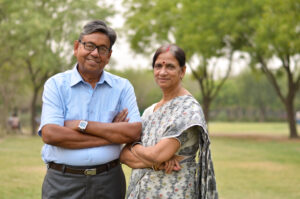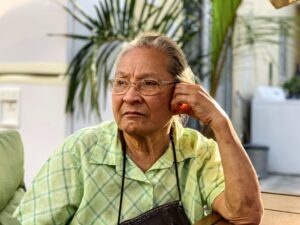The issues related to ageing are numerous and have to be tackled by society with understanding, resolve, and above all, empathy, writes Sonavi Kher Desai
“Grow old along with me! The best is yet to be.” These inspiring words of the poet Robert Browning would resonate with many seniors today. More and more seniors – people over 60 years of age – are looking at aging successfully by keeping themselves healthy, fit, and more active. However, there are several challenges that senior citizens have to confront as they get older.
According to the World Health Organization, approximately 12 percent of the world’s population is over 60 years old and this figure would be 22 percent by 2050. In India, says a report released by the Ministry of Statistics in 2016, citizens over the age of 60 accounts for 8.6 percent of the total population – a jump of a whopping 35.5 percent in 10 years.
 In the last 100 years, the global average life expectancy has more than doubled and is now about 70 years. A rapid advance in medical science and access to medical facilities and treatments have increased the longevity of human beings. In addition to this, economic well-being and a fall in birth rates in many parts of the world have contributed to a growing senior population.
In the last 100 years, the global average life expectancy has more than doubled and is now about 70 years. A rapid advance in medical science and access to medical facilities and treatments have increased the longevity of human beings. In addition to this, economic well-being and a fall in birth rates in many parts of the world have contributed to a growing senior population.
In India, the growth in the elderly population has been more than the growth in the general population leading to a sharp increase in seniors. An aging population has far-reaching implications, whether social, economic, or medical. As people age, several issues arise. There is reduced mobility, age-related ailments and conditions, a need for caregivers, financial worries, dependency, loss, the possibility of abuse, and increasingly, loneliness. Almost 75 percent of India’s population lives in rural areas which means that for every senior living in an urban area there are three in rural areas and both have their own set of specific concerns that need looking into.
The issues related to aging are numerous and have to be tackled by society as a whole – individuals, communities, NGOs and government – with understanding, resolve, and above all, empathy. Are we as a society ready for the challenges of a rising senior population?
Change in Indian Society
Indian society traditionally followed a joint family system which ensured security for seniors in the autumn of their lives. However, with the growing trend of nuclear families, and children living away from parents, seniors are often left to fend for themselves at a time when they most need help. The support system provided by the joint family has crumbled, leaving seniors vulnerable to distressing, and often traumatic, situations.
Many Indian children who go abroad to study decide to settle there. Parents are thus left behind to live on their own. An important change in Indian society has been the role of women. The percentage of working women has increased, as a result of which there is often nobody at home to take care of an aged person. Children, too, in today’s competitive world, are busy with so many activities in addition to school work that they do not have much time left for grandparents. Caring for the elderly requires patience and dedication and is increasingly considered by many to be a burden. A survey dated June 15, 2019 by the NGO HelpAge India reported that 35 per cent of respondents looking after the elderly said that they did not feel happy taking care of them.
However, the only constant is change and one has to accept that social structure is not immune to it. We therefore have to find ways to address the issues caused by this transformation in society and evolve new ways of handling them. One of the consequences of the changing family structure has been that assisted living has started to take shape in India. A wide range of options from government-run old age homes to five star assisted living communities have sprung up all over the country.
Issues faced by seniors
Seniors can actually be classified into two groups – “young seniors” (60 to 75 years) and “senior seniors” (over 75 years). With the increased awareness today about fitness and healthy living, young seniors are by and large active and able to manage on their own. It is the senior seniors who often require care-givers and assistance.
So what are the main issues that seniors face? Three major issues are related to health, finance, and loneliness. It must be noted that the root of all these problems can be traced to much before one becomes a senior. As Fred Astaire commented, “Old age is like everything else. To make a success of it, you’ve got to start young.” It is important to plan your finances and to follow a fitness regime from a younger age in order to minimise problems in senior years.
Good health is absolutely crucial as one begins to get older. With age, physical ailments are inevitable and it is essential to get good geriatric care at this stage. The five “I”s of geriatrics include Intellectual impairment, Immobility, Instability, Incontinence, and Iatrogenic disorders. The risk of falls in seniors is very high and the prevention of falls requires supervision. Falls can be caused by diminishing vision, osteoporosis, loss of strength, and medication, among other things. Fractures seriously impact an aged person, leading to a downward spiral. Pain management is another area that requires geriatric care.
What is often more worrying than physical health among seniors is mental health. Dementia and depression are mental conditions more frequently seen as people live longer. Alzheimer’s Disease is the most common type of dementia which affects memory, language, and thought. All these conditions require intervention and psychological consultation as early as possible. Caring for seniors with mental health problems can be very stressful and demanding.
Finance is another crucial area for seniors who have normally retired from active working life. To enjoy a financially comfortable post-retirement life, it is necessary for India to start planning your finances from the time you start earning. High inflation levels mean that the money you have saved can be less than sufficient to lead a good life. It is therefore essential to take good advice from experts and make up a savings plan. Life and health insurance, children’s education schemes and saving for medical emergencies are other areas to consider. It is also a good idea to make a will and maintain a record of financial investments and passwords so that in the event of serious illness or demise, family members have easy access to this information.
Some of the above apply more to seniors living in urban areas who would have worked in the organized sector and can avail of retirement benefits. However, the vast majority in rural areas would have worked in the unorganized sector and have no recourse to benefits in later life. They are therefore much more dependent on family members. For them, the government has to step in to provide pensions and other benefits.
As younger people get more and more caught up in their own lives, seniors find themselves increasingly alone. It is important that they maintain social contact with family and friends in order to prevent depression and isolation. Seniors should also be encouraged to take up part-time work or involve themselves in community activities if they are mobile.
Practical problems faced by seniors
As one gets older one moves from one stage of life to another. Things that seemed easy to accomplish earlier now seem difficult. Practically speaking, seniors face issues with mobility, lack of open spaces, security, and neglect. In most cities in India, it is almost impossible for senior citizens to walk on the road. If there is a pavement – which is often not the case – it is uneven and dug up for repairs. Moreover, the traffic rushes past at uncaring speed, not even stopping for seniors. Even if they were able to manoeuvre their way through the traffic they would have nowhere quiet to go. There is an appalling lack of parks, gardens and open spaces in our cities where older people could safely spend some time. The Nana-Nani park initiative for seniors is a good one but there is a need for many more.
Another area of concern with regard to senior citizens is security. There have been any number of cases reported in the press about burglary and even murder of seniors in their homes. Sometimes these are committed by the very people who are employed to protect them. Seniors living alone are the most vulnerable. It is important for local police stations to take proactive measures to monitor their homes and provide adequate security. There also needs to be a mechanism in place for seniors to request police help and to be assured of an immediate and prompt response to their appeal. This also applies to medical help vis a vis a hospital whereby an ambulance can be sent immediately and the hospital and a family member is immediately alerted to the emergency.
Geriatric care for prevention and treatment is absolutely essential for the elderly. This is easier for those who can afford to pay for private healthcare. However, government hospitals have to be better equipped to provide geriatric care for poorer patients in both urban and rural areas. Interventions that reduce the risk of falls in the elderly are among the most important contributions to long term better health in the elderly. These interventions can range from something as simple as furniture rearrangement in the home and provision of a walking stick or walker to complex changes in medications. Also, installation of grab bars or handrails on stairs and in public places, as well as physiotherapeutic mobility improving exercises are important useful measures.
Retirement often means reduced funds and this can have a negative impact on healthcare and nourishment. A positive and well-planned approach in such cases can go a long way in helping to maintain a healthy life.
Man is a social creature and needs company. Living alone or lacking mobility could in turn lead to isolation, loneliness, and depression. It is therefore important for family and friends to make the effort and provide social contact for the aged. Seniors should be encouraged to participate in yoga, meditation, music, games, interest groups – anything that they can take part in to remain socially active. In this context, ease of movement is necessary for seniors to be able to go out and engage with the world. Wheelchair ramps and grab bars in concert halls and at other public spaces will encourage them to be more social. Reserving parking spaces as well as seats in public transport, and designated queues make life more comfortable for seniors.
Older people naturally react well to children. Children raise the positive energy level in the home and need to be encouraged to spend time with the aged.
Unfortunately, these days one hears of more and more cases of harassment and abuse of the elderly. Family members and others wanting to usurp their property resort to all sorts of tactics to intimidate the aged. Although there is legislation to safeguard the rights of the elderly, it is often difficult to enforce.
Dependency is another issue that creeps in with age. People who have been independent all their lives become dependent on others due to bad health or a financial crunch. This can lead to emotional and mental troubles, as also to exploitation.
What can we do?
Everyone has a role to play in caring for the elderly. Family, the community, NGOs and government, all deal with different aspects with regard to seniors. However, everyone needs to first and foremost approach their issues with empathy.
Family members are often primary care-givers for seniors who are not in good health. A warm, caring approach will go a long way in making them feel comfortable. Good geriatric care, a feeling of inclusion, and financial security can make the final years happy. Teaching children to respect seniors and treat them well will also go a long way in creating a welcoming atmosphere for the aged.
Our community can also contribute to improving the lives of seniors. Nutritious meal services and community activities can greatly help seniors. Assistance from community members by way of volunteers to run errands etc would benefit the elderly. Seniors have their own skillsets and they can be encouraged to impart those skills to others. This will keep them mentally challenged and socially connected.
NGOs play a big role in addressing the issues of the elderly and in educating society at large about the problems faced by them. They advise seniors about their health and safety and train volunteers to help them. Some NGOs also provide counselling and support as well as basic medical services, in addition to running homes for the aged.
The role of government in supporting seniors is very critical. In 1999, a National Policy was formulated by the Social Justice and Empowerment Ministry which aims to help seniors live with security and dignity. However, crimes against elders are increasing as documented in the HelpAge India report. These can be physical, emotional, sexual, financial, or just plain neglect. Elder abuse takes place in all strata of society, and is inflicted by both family members and outsiders. It is important that immediate action is taken against the perpetrators of crimes against seniors and that every effort is made to prevent such crimes from taking place.
The government has enacted the Maintenance and Welfare of Parents and Senior Citizens Act, 2007, to safeguard the rights of the elderly with penal provisions for abandonment of the elderly. (http://socialjustice.nic.in/writereaddata/UploadFile/Annexure-X635996104030434742.pdf) The government also implements pension and benefits schemes and programs for seniors under several ministries viz. Rural Development, Health & Family Welfare, Finance, Home Affairs, Railways, and Civil Aviation. (https://www.india.gov.in/people-groups/life-cycle/senior-citizens). The Pradhan Mantri Vaya Vandana Yojana (PMVVY), is a recent pension scheme launched in 2017 and operated by LIC. Although legislation and government schemes have been formulated, a lot more needs to be done to help seniors face day to day challenges.
Listed here are some things that can be put in place to safeguard the life and property of seniors.
- Formulation of senior citizens security cells and dedicated senior citizens toll-free helplines.
- Police stations should have comprehensive documentation of all senior citizens in its area whether living alone or in joint families and a mechanism to provide prompt assistance.
- Regular visits by constables to the residence of the elderly and patrolling both during daytime and night, to provide a feeling of security to the elderly.
- Police registration and check of domestic help hired by senior citizens who are living alone.
- Security guards verification by the police.
- Installation of security systems for added safety.
- Regular interaction between senior citizens of the area and the police.
- Seniors should be registered in a hospital nearby with a mechanism for prompt assistance and for alerting family during an emergency.
- Fast-track courts for complaints of abuse of or crimes against seniors.
Seniors can contribute to their own safety if they follow some Do’s & Don’ts.
- Make a note of the phone numbers of police stations, hospitals, fire stations, family doctor’s numbers or emergency medical services and special helpline numbers.
- If living alone, notify your neighbors and also the manager of your housing society.
- Never leave your doors unlocked and ensure security measures in the home.
- Ask for proper identification from delivery persons or claims to be from a utility company or other local business and cross check in case of doubt.
- Do not give out personal information to anyone who calls you, especially bank account or credit card information.
- Never give out information over the phone indicating you are alone or that you won’t be home at a certain time.
- Do not keep a lot of cash/jewelry/valuables at home.
- Never leave spare keys or even the original keys in the open.
- Employ staff only after verifying antecedents with the nearest police station.
Finally, every person is different and every person handles aging in their own way. However, one’s attitude toward life contributes to the quality of one’s later years. Approaching senior years with positivity, foresight, and discipline can lead to a happy and contented older life. As Henry David Thoreau said, “None are so old as those who have outlived enthusiasm.” It is up to each individual to decide how old he or she wishes to be.








